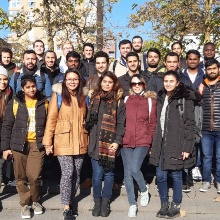The Master´s Program Infrastructure Planning (MIP) aims to provide international students, especially from the Global South, with an interdisciplinary education. The course focuses on the planning and implementation of complex projects in the fields of regional and urban planning as well as in technical infrastructure, taking into account ecological and economic requirements.
Since 1983, the University of Stuttgart has been providing the practice-oriented and globally esteemed Master´s Program Infrastructure Planning (MIP), engaging five faculties comprising 13 different institutes, along with contributions from external lecturers.
The target group of MIP consists of civil engineers, architects and urban planners who wish to gain insight into infrastructure planning in a broad, integrated context and who want to prepare themselves for working in international and complex planning.
Required is a bachelor's degree in civil engineering, architecture, regional or urban planning, or related fields. Professional experience in one of this fields is appreciated. Excellent English is required. Students should be interested in an interdisciplinary approach to regional and urban planning as well as to the planning of technical infrastructure and should be willing to acquire intercultural experiences.
Within the curriculum of the Master's degree program MIP, the focus is on an integrated planning approach. In the MIP course, civil engineers, architects, and regional planners are intentionally grouped together in the same year, fostering an immersive learning environment that emphasizes intercultural and interdisciplinary approaches to tackling complex planning tasks. In addition to their individual previous education from the Bachelor's degree, they can thus acquire broad knowledge in the Master's degree program MIP and qualify for management tasks in international project groups.
It is possible to specialize in specific fields, due to the flexible combination of the four elective modules (out of a catalogue of more than 10) as well as the selection of a topic for the Master's thesis.
Graduates possess a comprehensive understanding of the complexities inherent in integrated infrastructure planning, enabling them to contribute to significant national and international projects or undertake planning responsibilities at the local level. Another professional objective is strategic development planning at various levels.
Possible employers include engineering offices and international consulting firms, planning authorities at all levels, national/international development cooperation organizations as well as NGOs and technical cooperation organizations, among others.
Studying abroad: what opportunities does my study program offer?
Because the MIP degree program is explicitly aimed at foreign students, it already constitutes a stay abroad for students. On average, a year group is made up of more than 15 nationalities and is also mixed in terms of subject background (architecture, civil engineering, etc.). This creates a wide range of opportunities for intercultural and interdisciplinary learning experiences during the course. For this reason, and also due to the recommended sequence of modules, no semesters abroad are planned.
Students can plan a stay abroad as part of their Master's thesis in the fourth semester if their topic requires it. A large proportion of graduates uses this opportunity to reintegrate in their home country or to pursue a career in the international field.
Application and admission: how do I get a place at the University?
Admission Requirements
- A bachelor’s degree or equivalent in civil engineering, architecture, regional or urban planning, geodesy, environmental engineering or related fields
- An excellent academic record
The complete information on the admission process, required knowledge of English, and the criteria for the assessment of professional suitability can be found in the admission regulations.
Language Requirements
Proof of English language proficiency in form of internationally recognized test scores (TOEFL or IELTS). This proof is obligatory for every applicant except for English native speakers.
First amendment (erste Änderungssatzung) [de] – August 17, 2012
Application period for the winter semester: November 15 – February 15
The winter semester starts in October.
How is the program structured?
Modules offered in MIP include:
- General Aspects of Infrastructure Planning
- Statistics and GIS
- Environmental Aspects
- Regional and Urban Planning
- Transport Planning and Modelling
- Water and Power Supply
- Sanitary Engineering
- Case Study
All students have to complete the nine mandatory modules, but the selection of the four elective modules (out of a catalogue of more than 10) allows for individual specialization. Also, students are free to choose the Master’s thesis topic from the whole catalogue of fields tought in MIP to specialize in a topic relevant to their individual career plans. They can work on a topic from their home country, from the international context, or they can choose a project in Germany.
Details can be found on the website of the degree program.
MIP does not include compulsary internships.
The module handbook and the study program curriculum describe the individual modules with the associated courses, content and examinations.
- Curriculum and Module Handbook
Study program structure and detailed module information by clicking on the book symbol
Important Websites
Which institutes are involved in this study program?
Accreditation

Contact

Elke Schneider
Course Director MIP: Application / admission and all DAAD-issues

Marion Aschmann
Dr.Course Director MIP



